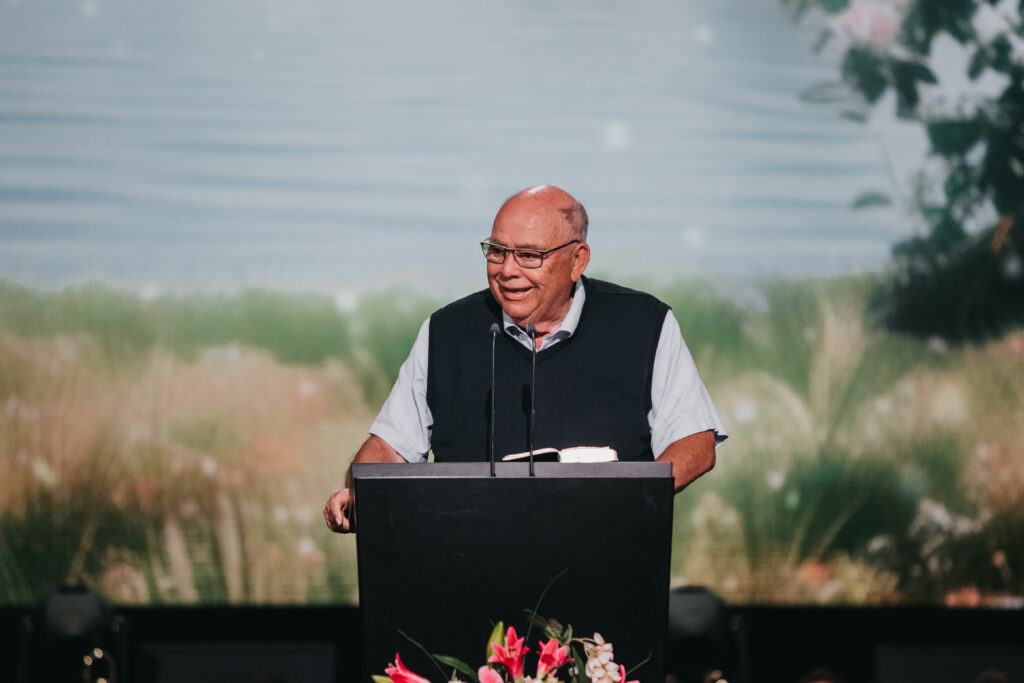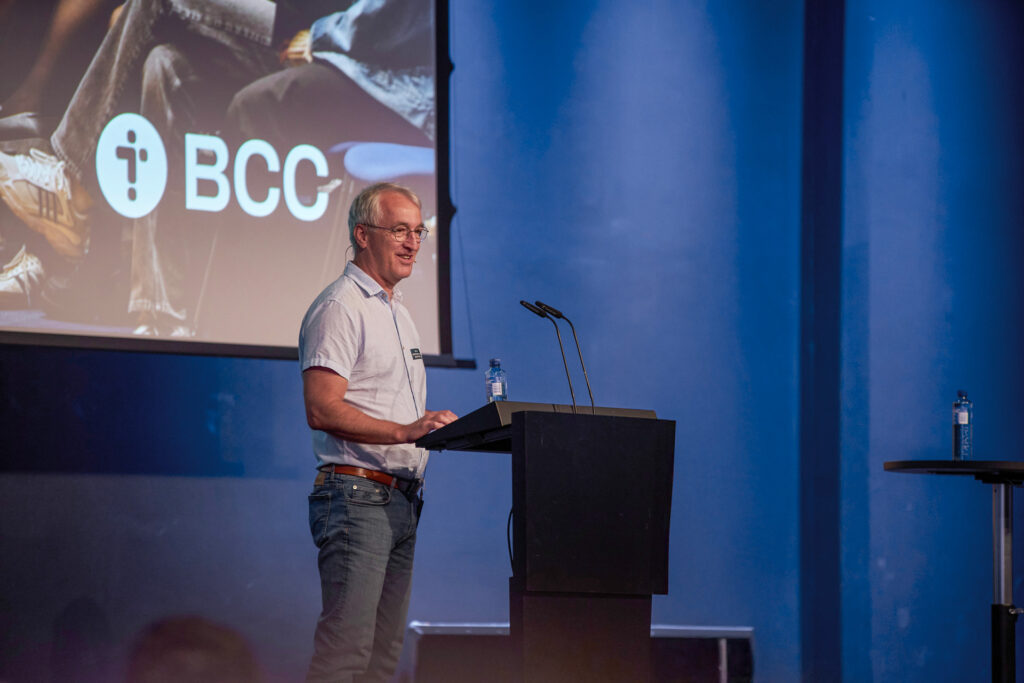Reading time: 10 minutes
In today’s society, it is by no means a matter of course that one perceives the value of Christianity. I am essentially trying to understand why Harald Kronstad is a Christian..
What was it about the message that attracted you?
“My mother’s life,” Kronstad answers spontaneously. “It was the best preaching for me in my youth: In my mother and father, I saw that there was a connection between life at home and the message I heard. You don’t get a better translation of the Bible than that. ‘Be anxious for nothing,’ ‘Judge not,’ ‘Let your sun rise on the evil and the good’ – I saw this in practice.”

I experience Harald Kronstad as someone who has also lived in this way for many years. For as long as I can remember, he has preached the gospel at the conferences. His preaching presents the listeners with a choice, as he portrays the difference between living in sin against one’s better judgment, compared to choosing to do God’s will. You cannot serve two masters.
Personally, I experience him as a warm person, interested in those he talks with, and a master at lifting others up.
Bringing out the nuances.
We talk about the purpose of the interview, namely, to highlight more nuances around what we preach and to talk a little about how we understand ourselves. Much is probably obvious to those who are part of the church, where they experience love and warmth. Others may have stories about having to face inordinate demands about how one should live as a Christian.
In that context, there is one point that is important to Harald:
“We must show consideration regarding why certain questions are asked, not just categorically reject them. I believe there are those who have found it difficult to live a life where they seek to imitate Jesus. If we take a somewhat critical view of ourselves, then I think it was about time that we described more clearly what we believe in, so that this is not based on misunderstandings. Each one can then freely decide whether the faith and the understanding we have of the gospel is something that also appeals to their own heart. We don’t want anyone to remain among us against their own will, and perhaps later be left with unhappy experiences.”
This is a topic we will return to. It’s also possible that not everyone finds the message as inviting as I do. That’s why I probe a bit more about what thoughts he has when, as an elder, he preaches God’s word.
Preaching a high ideal, but does it go over to perfectionism?
When you hold up such a very high ideal, have you thought about how it affects the audience in the hall, and the young people?
“I think it is important regarding the preaching, that there is a shared understanding between the preacher and the listener that this has to do with a life in development. It starts as a small mustard seed, smaller than all the seeds on earth, says Jesus. By God’s love and grace, and by the preaching of the faith and the help of the Holy Spirit, it grows day by day. It’s not ‘abracadabra’. Life’s trials meet us all, and we are put to the test. I think it is important in the preaching to be aware that the gospel is not presented as an achievement, but as an attainable life to be lived through God’s grace and help.”

Harald uses the example of a tightrope walker – if you take one step off the wire, you’ve had it. Kronstad believes that such preaching leads to perfectionism, and points instead to what the Master has taught us:
“Jesus talks about not breaking a bruised reed nor quenching a smoking flax, so of course we mustn’t do that either. Imagine getting grace to breathe life into what is near to dying out. Jesus’ message is simple, so our preaching should be too. He sets the bar as something attainable. Jesus asked, ‘What is it you want?’ He already knew what they needed but He wanted to hear them say it themselves. So, He didn’t ask complicated questions, but wanted to know about their heart’s desire.”
“In many ways, it’s really about only one thing: Doing God’s will and not my own; that is what it means to follow Jesus”
Harald Kronstad
Elder – a role based on trust
Some may think that it is attractive to have the role of an elder, but in BCC no salary follows the job. Elders are chosen according to the biblical pattern. Often, it is not the person who really wants to be an elder, who becomes an one, but the one who is best suited.
How did you actually become an elder?
“The person who was the elder before me began to be old and frail, and I was asked by the principal elder in Norway if I could take over the main responsibility for our local church.”
Harald has no need to assert himself. But it can be a bit difficult for others to understand; how we do not elect elders democratically, but according to “the biblical pattern.”
This is how leadership is organized
In the current organization of BCC, the supervision is divided into two parts.
The Elders have the spiritual responsibility for the church’s teaching and the content of events, while the Assembly of Representatives has the practical, financial and strategic responsibility.
The local churches are organized in the same way; the elder has the spiritual responsibility, while the board and the annual general meeting are responsible for practical and financial issues.
The Elders Gatherings: Small, smaller, least
Every year, the Elders summons a meeting of church elders that is held over several days. This is a tradition that has continued ever since Elias Aslaksen’s leadership in the 1950s, where church elders from large parts of the world meet.

How do you experience having fellowship with other elders and people with ministries in BCC, internationally?
“I really enjoy this fellowship, and always feel that I have a lot to learn. I experienced how lowly they are in their own eyes, their poverty in spirit and their humility, whilst at the same time sensing their spiritual strength and strong faith. This has an inspiring and crushing effect all at the same time.”
It makes an impression to hear what is at the forefront of people’s minds regarding the fellowship between elders. The focus is not exactly on power struggles and arguments about who is the greatest.
“We have been given a task here on earth, namely, to build Christ’s body, His church, and to win disciples for Jesus. We need help and ideas for how we can best carry out those tasks, in a way that we imagine Jesus would have done it. Talking about and sharing one’s need on those topics independent of age, culture and gender, is something I find very enriching.”
Who can be an elder and have a ministry in the church?
I nearly have to ask, since he makes mention of gender.
Is it like this that when we think of elders and church servants, that both men and women are included?
“I stated this intentionally, because traditionally we tend to think of only men. But I believe I have a lot to learn from sisters and the different church workers. After all, we have entered into other people’s work. Many godly people, both women and men, have been involved in the work here – long before us.”
He picks up the Bible and reads from the Gospel of John 4:36-38. “He who reaps receives wages, and gathers fruit for eternal life, that both he who sows and he who reaps may rejoice together. For in this the saying is true: ‘One sows and another reaps.’ I sent you to reap that for which you have not labored; others have labored, and you have entered into their labors.”
“It can be easy to become puffed up if one does not understand that it is others who have labored, and we have entered into their labor. It is easier to receive honor in the time of the harvest than in the tribulation of sowing. But we must work together with respect and gratitude for the work God is doing in our time and how God-fearing people have worked with individuals before us.”
The love of Christ and people as a driving force
Why are you doing this? What is driving you?
“So, what does Paul say? He says that the love of Christ compels me. When we know the fear of God, we seek to win people. Our love of Christ and of people must be the driving force. Otherwise, we grow weary.”
You are also involved in ecumenism, i.e., cooperation with other Christians, why is that?
“I believe it’s good and right to embrace sincere love for Jesus and the gospel, irrespective of which part of the Christian landscape they come from. I really appreciate encountering people who carry out a work that has not been placed on my shoulders. An example is people who stand up against the new and radical gender ideology in a knowledge-based way, and prevent it becoming an emotional debate.
He believes that we need to stand together with those who want to protect the conditions for Christianity in society, and this will undoubtedly be of increasing benefit to us.
“At the last board meeting of the Christian Council of Norway, it was the first time I have heard so many express a concern that Christianity is becoming marginalized. We must be aware that we have a different way of life and faith than what is ‘mainstream.’ This will demand something from all of Jesus’ disciples in the time ahead.”

Cooperation with other Christians
When Christians are going to work together, it’s easy for the differences to be highlighted. But across different denominations there are many common features and basic understandings.
What is the biggest difference between us in BCC and other Christians?
“I think it is better to leave it to others to say what they believe. We can tell people what we believe, and then they can assess the differences and make their choices. For us, the Sermon on the Mount is an important spiritual foundation. Jesus ends His message by illustrating the difference between those who obey the word and those who do not. James also mentions in his letter that a faith without works is a dead faith. Faith should lead to a life. It is a fact that Jesus, who was true God in His pre-existence, became a true man and was tested in everything like us. We read that He had His own will which He had to deny, but that He had a great yearning to do God’s will and this He accomplished totally and utterly.”
“Jesus’ preexistence.” I have never heard such an expression from the pulpit or read of such in our edification literature. But I noticed the more theological language in the description of the basis of faith. I observe a difference between academic terminology and the more admonishing language that characterizes our gatherings, where most people are probably occupied with the more practical aspect.
A full gospel
“But the fact that Jesus was our forerunner, gives enormous hope to those who are bound by the power of sin. It is, after all, a central part of our preaching. Jesus is not only our propitiation – although that in itself is very great – but He is also our forerunner so that we can follow His example. A full gospel is proclaimed, which encompasses everything from reconciliation and the forgiveness of sins to a life of sanctification and conformation to the image of God’s Son.
“There is an incredible amount of good in other evangelical churches’ descriptions of what they believe in, and we can align ourselves with most of it. But how this faith affects how we live our lives is up to the individual’s godly fear, and here I believe the emphasis in the preaching and the spirit in which the message is brought forth, has a great impact on people’s life of faith.”
We touch the topic of sanctification, and to what extent we can achieve the likeness of Jesus. Here, Kronstad speaks plainly:
“The Gospel sets no limits on how far a person can develop in sanctification. It depends on the individual’s longing and godly fear”
Harald Kronstad



